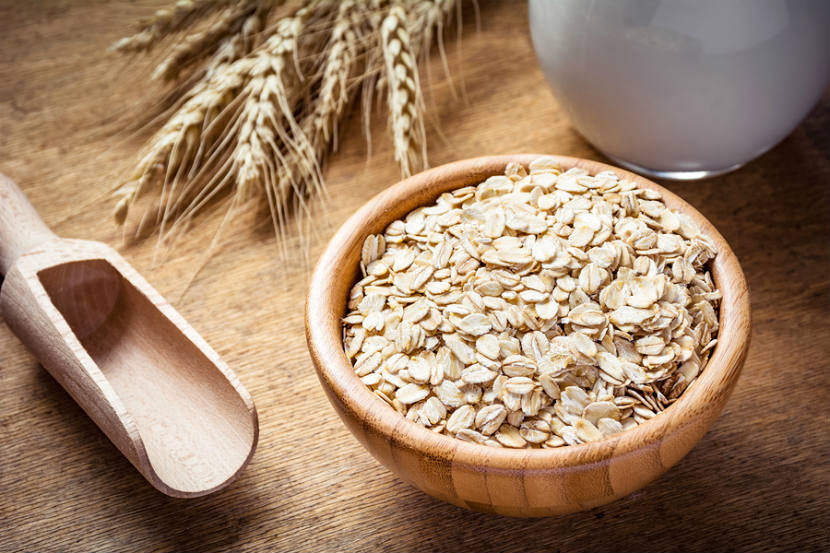
What can be better on a cool morning or before a long bike ride than a hearty bowl of oatmeal? Oats have many health benefits. Here we’ll explain why you should make oats your breakfast more often.
Nutrition spotlight on oats!
Oats are a whole grain. Whole grains are high in fibre and provide B vitamins, vitamin E, minerals, healthy fats and antioxidants.
People who eat more whole grains tend to have a lower risk of heart disease and stroke, diabetes, cancer and digestive disorders. Soluble fibre such as that found in oats helps improve blood cholesterol and control blood sugar levels. Eating insoluble fibre such as that found in wheat bran helps keep your digestive system healthy and prevent constipation.
The fibre found in whole grains can also help with maintaining a healthy weight.
What are the different types of oats?
Here are the different types of oats from the least processed to the most processed. The less processing the oat grain goes through, the more health benefits it has.
Steel-cut: Also called Irish or Scottish oats, these oats are closest to their original grain form. They consist of the entire oat kernel which has been sliced once or twice into smaller pieces to help them cook. It can take anywhere from 15-60 minutes to prepare steel cut oats. A bowl of steel cut oats has a chewy, nutty texture and is highly nutritious.
Rolled oats: These are also known as “old fashioned” oats. To get rolled oats, whole oats are toasted, hulled, steamed and then flattened with giant rollers. Muesli and granola are usually made with rolled oats. Rolled oats take about 15-20 minutes to cook.
Quick cooking oats: These are similar to rolled oats, but they have been cut before being steamed and flattened. This helps them cook quicker. They are also good to use in baked goods such as quick breads and muffins.
Instant: These are the kind you usually find in the flavoured packets that have added salt and sugar. To make instant oats, the oats are cut, pre-cooked, dried, steamed and then flattened. The many steps used to create instant oats is why they cook so quickly. However, because the oats go through so many processing steps most of their nutrition has been lost.
Other oat products
Oat flour: You can make oat flour by grinding rolled oats in a food processor or blender. Oat flour makes baked goods that taste nutty and have a moist and crumbly texture. You can substitute up to 30% oat flour for all-purpose flour. For example, if your recipe calls for 1 cup of all-purpose flour, you can use up to 1/3 up oat flour without affecting the texture of the final product.
Oat bran: Oat bran is made from the outer layer of the oat kernel. Whole oats always include the bran layer, but it is sometimes separated from the rest of the grain to make oat bran. Oat bran is high in fibre and is often eaten as a hot cereal or sprinkled on a cold cereal. It can also be added to muffins, breads, pancakes and casseroles for added fibre.
Can people with celiac disease eat oats?
Yes. People with celiac disease can eat pure, uncontaminated oats. However, because of the way oats are grown, they are often contaminated with gluten from other grains. Most of the oats that you’d find in the grocery store are contaminated with gluten and are not a good choice for people with celiac disease.
Adults with stable celiac disease can consume up to 1/2 to 3/4 cup (125 to 175 mL) of dry uncontaminated oats each day. Children can take up to 2 tbsp to ¼ cup (30 to 60 mL) dry uncontaminated oats each day.
If you have celiac disease and want to consume uncontaminated oats, speak to your doctor or dietitian before starting.
Can eating oats help control blood sugar for people with diabetes?
Foods that are high in soluble fibre, such as oats, may help improve blood sugar levels for people with diabetes.
Does eating oats help decrease cholesterol?
Research has shown that eating soluble fibre, such as oats, may help to improve LDL cholesterol (the kind of cholesterol that is bad for your heart). The soluble fibre found in oats is thought to trap cholesterol in the digestive tract and remove it from the body. Other foods with soluble fibre are beans, cereals with psyllium, okra, eggplant, barley and some fruit.
Not only are oats good sources of soluble fibre, but they are also a whole grain. Eating whole grains, like oats, brown rice, bulgur and quinoa, is associated with lowered risk for heart disease.
Getting more oats into your diet
For more information:
Choosing whole grains FAQs
Focus on fibre
Phytonutrients – nature’s natural defense
Last Update – October 13, 2020